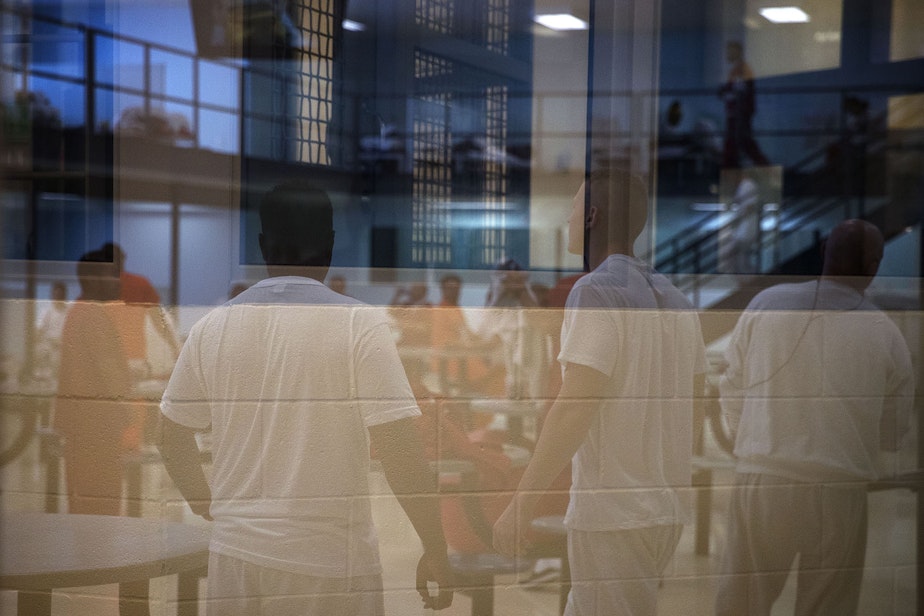Washington state and detainees challenge $1-a-day pay policy

Opening arguments began Wednesday in a lawsuit filed by Washington state against GEO Group, the private company that runs the immigration detention center in Tacoma.
At issue is whether or not GEO Group must pay its detainees the state minimum wage for work they do at the facility. They currently earn $1 a day.
The lawsuit involves what GEO Group calls its voluntary work program, which includes cooking and cleaning in the facility. Gene Johnson is covering the trial for the Associated Press. He told KUOW’s Kim Malcolm about the details of the trial.
This interview has been edited for clarity.
Kim Malcolm: How is it possible that detainees get paid just $1 a day?
Gene Johnson: Years ago, Congress set that as the rate of pay for detainees who perform this kind of work. It is possible to pay them more. It's also worth noting that ICE requires the GEO Group to offer this sort of voluntary work program as a way to keep the detainees occupied.
The GEO Group's argument is that this isn't actually a paid employee relationship, that this is something separate?
Johnson: Right. The GEO Group notes the turnover is astronomical. It's really not an efficient way to run a business. They describe it almost as a burden that they have to run this. They say that they're not actually profiting from running the voluntary work program.
Sponsored
And the Washington state attorney general is suing them on what basis?
Johnson: Washington's minimum wage law does exempt detainees of government-owned prisons, jails, and detention facilities from having to be paid the minimum wage for work that they perform. However, Attorney General Bob Ferguson says that exemption in the law does not cover a privately-owned facility that's run by a for-profit corporation.
Part of the general overhead of running this facility is that you need people to clean it, you need people to cook meals, you need people to work in the barbershop. The Attorney General says by not paying the minimum wage for those types of tasks, GEO has unjustly profited. Beyond that, he also says it has deprived jobs from people in the local community who might otherwise be employed there.
What is the State Attorney General's Office seeking from the court here?
Johnson: First, it wants a finding that the minimum wage law does apply to the detainees, that these detainees are employees. If the jury finds that, then there will be a trial over damages. Meanwhile, there is a separate lawsuit also being heard. It's a class action filed by detainees. They are seeking back pay for anyone who performed work in this program since late 2014.
Sponsored
What would a victory in court mean for the detainees at the Northwest Detention Center?
Johnson: It would mean a lot more money if they're paid the minimum wage to do these tasks. An attorney for the plaintiffs mentioned to the jury during opening statements that one of his named clients, a class representative named Goodluck Nwauzor, fled with his family from Nigeria after Boko Haram destroyed his store.
He wound up spending a year in custody at the Northwest Detention Center as he sought asylum. Eventually, he was granted residence and got a job at a Seattle hotel, but he was laid off as a result of the pandemic. Receiving that back pay now from the work that he performed in detention would presumably mean quite a lot to him.
Meanwhile, in a separate legal battle, GEO Group has filed a lawsuit against Washington state in federal court. That came after the state Legislature passed a law this year that bans private detention facilities. The law allows GEO Group to operate the detention facility until the year 2025 when its contract expires with ICE.
Listen to the interview by clicking the play button above.





